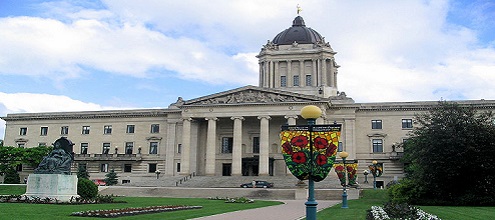
Market boosters should support made-in-Manitoba carbon tax
Premier Brian Pallister supports carbon pricing and is in the process of designing a made-in-Manitoba carbon tax. He is right to do so, as it is the single best way to reduce the province’s greenhouse gas emissions. Opponents must explain why they are prepared to put Manitoba’s economic prosperity at risk by favouring approaches that are less market-friendly.
We should begin by agreeing that doing nothing about climate change isn’t a realistic option. We are experts on economics and business, not on climate science, so we focus our attention on the significant economic costs of climate change and on the best way to address the problem. Ignoring the issue isn’t economically sensible and neither is delay. The longer we wait to reduce our emissions, the more costly it will be to do so.
If the Manitoba government is committed to reducing emissions — as it is — then it must make an important policy choice about how to do so. There are two basic approaches.
One way would be to impose intrusive regulations, forcing businesses and households to reduce their emissions by specifying which technologies they must use, how much they can drive or how much they can heat their homes. In addition, government could provide generous subsidies for a wide range of clean-tech projects.
Hardcore environmentalists and those on the left of the political spectrum sometimes favour this approach. They tend to believe effective regulations are easy to design. And they often like the idea of generous subsidies because it allows governments to “pick winners,” something they think is both desirable and possible.
Most economists, who naturally worry about the costs of various government policies, don’t support this approach. They strongly prefer a second option, one that should also appeal to those — such as pro-market conservatives — who recognize the value of harnessing market forces. This second option is for government to impose a simple tax on carbon emissions and then let households and businesses figure out for themselves how best to reduce their emissions.
A carbon tax is much less intrusive than regulations and offers households and businesses far more flexibility in how they choose to reduce emissions. This flexibility is a key reason why a carbon tax is better for the economy — emissions get reduced at a much lower overall cost. And since a carbon tax provides broad support for emissions-reducing technologies, expensive subsidies aren’t required.
In addition, there is plenty of analysis showing carbon pricing works to reduce emissions. For example, current research shows the carbon tax in British Columbia has reduced provincial emissions by between five and 15 per cent from what they would have been in the absence of the tax.
Another advantage of using a carbon tax is that the revenue collected can be recycled back into the economy. One recycling option is to reduce existing personal or business income taxes. Since income taxes are among the most growth-retarding taxes ever created, such a move would be good for economic growth. It also makes sense at the personal level: Wouldn’t you rather face a tax you’re free to avoid (by reducing your emissions) than one applied to the income you’re working hard to increase?
Some people point out that a Manitoba carbon tax would raise the costs for businesses and put them at a competitive disadvantage relative to their rivals from jurisdictions without carbon pricing. This is true, and it is too important an issue to be ignored. But it is also relatively straightforward to address this problem by recycling carbon revenues carefully.
The Manitoba government could use some of the revenues to reduce the small business tax rate. It could also provide direct support to the “emissions intensive and trade exposed” parts of the economy. Such support could be designed so businesses facing the carbon tax have an incentive to expand and thrive — while also reducing emissions — rather than losing market share to their rivals from outside the province.
Nobody should believe that reducing emissions will be easy. Even with the best policies in place, we will all need to adjust the way we produce, consume, work and play. And even then the reductions will occur bit-by-bit, year after year.
But there is no lower-cost way to achieve these reductions than with a broad-based tax on carbon emissions. Premier Pallister should be applauded for his policy savvy.
Christopher Ragan is a part-time resident in Gimli. He is an associate professor of economics at McGill University, chair of Canada’s Ecofiscal Commission and a member of the federal government’s advisory council on economic growth.
This piece was originally published by Winnipeg Free Press on August 10, 2017.




1 comment
“Hardcore environmentalists and those on the left of the political spectrum sometimes favour this approach.”
What’s with the pot shot?
You call out specific groups, getting their backs up, and then you use the weasel word “sometimes”. If you’re going to say “sometimes”, why not just go full weasel and say “Some people favour this approach.” What’s gained by calling out “hardcore environmentalists” (what does that mean, anyway?) and those on the left?
Comments are closed.